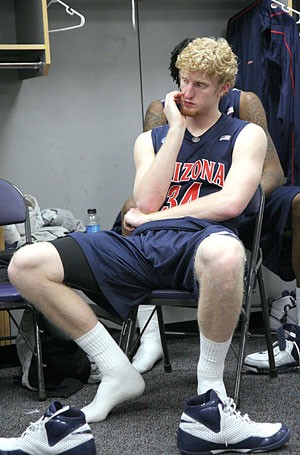WASHINGTON – The closing chapter of the “”The Saga”” has finally been written.
With the many ups and downs the Arizona men’s basketball has gone through, that’s what interim head coach Kevin O’Neill has likened the season to, as it has felt like several years worth of basketball to him.
Although the season ended in what’s becoming painfully familiar to the Wildcats – a first-round loss to a beatable team- this has been anything but a typical Arizona season on and off the court.
“”It was a roller coaster ride for us. It really felt like that,”” said UA forward Chase Budinger. “”It was really a grind-out season.
“”At times you’re at highs, and there are other times where you’re at lows, and it’s like that throughout the whole season,”” he added. “”There was never really a constant throughout the whole season, and that kind of drains you.””
By the end of the year the team looked ready for the season to come to an end, both mentally and physically. Trailing by 10 with 38 seconds left in their season-ending loss to West Virginia, the Wildcats were content to let the Mountaineers run out the clock instead of continuing the fight by fouling. It likely wouldn’t have mattered in the end, but that action seemed akin to waving the white flag.
The season started poorly from day one, when players arrived to their first exhibition game Nov. 4 to the news that UA head coach Lute Olson would be taking an indefinite leave of absence. Not even the players knew for how long that would be and were forced to play the first month of the year with a cloud of uncertainty over
the program.
Then on Dec. 6, Olson announced he would be taking the rest of the year off on the same night he also filed for divorce. On Dec. 18, O’Neill was named coach-in-waiting, a position that seems to have been created to show there’s a plan for the future although it looks tenuous at best with O’Neill uncertain to even return next season.
The team battled through and got off to a hot 9-2 start against one of the toughest nonconference schedules in the nation.
Then the injury bug hit a depth-deprived team and went 1-3 without guard Jerryd Bayless and later 2-5 without guard Nic Wise, with no capable point guards after guard Laval Lucas-Perry transferred on Dec. 10.
The Wise injury marked the turning point of the year. Arizona had just bounced back from the Bayless injury by winning three in a row, including big wins over then-No. 6 Washington State and at USC, before falling flat at then-No. 5 UCLA.
But they never truly recovered from the injuries, as the team won just twice since January besides a pair of blowouts against Oregon State.
“”I just know I really appreciate what these guys did day in and day out to stick with us as well as they did, and they deserve a lot of credit for what they did and what they’ve been through,”” O’Neill said. “”And hopefully it makes them a better team and better players down the line.””
Although the injuries hurt, the coaching change colored the entire year. Without a moment’s notice, the team went from the legendary Olson to the gruff O’Neill, who’s not afraid to chew out a player with a curse word or two.
On the floor the team went from a free-flowing, open-court offense to an attack that relies on more set plays and from a defense that mixes in zone to a strict man-to-man defense that O’Neill believes in. The coach had no time to teach his system to players who did not come to Arizona to play for him.
“”It’s definitely not what you signed up for,”” Budinger said. “”I came in last year thinking we were playing one style and the next year coming around and just totally flip-flopping and playing a different, another style, that kind of got to me a little bit.””
O’Neill fluctuated minutes on his bench with no player developing a set role, and save for forward Bret Brielmaier – who also missed 13 games to injury but became a key contributor – nobody made much of a dent outside the team’s five core players.
During league play, especially when Wise missed action, the bench practically disappeared. By league and NCAA tourney time O’Neill rode his starters until they dropped.
“”I think we fought hard,””
McClellan said, “”and considering we’re all playing 38-40 minutes a game, that’s not your normal minutes for an average team. I don’t think we went out there and lacked heart at all.””
But after a year of coaching drama, injuries and heavy minutes, the rollercoaster reached its final stop and the saga’s closing credits rolled as the Wildcats puttered out in the first round of the NCAA Tournament.









